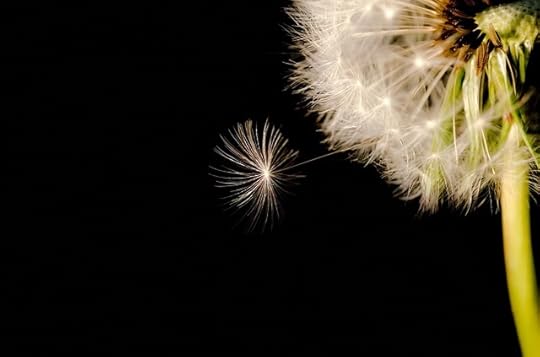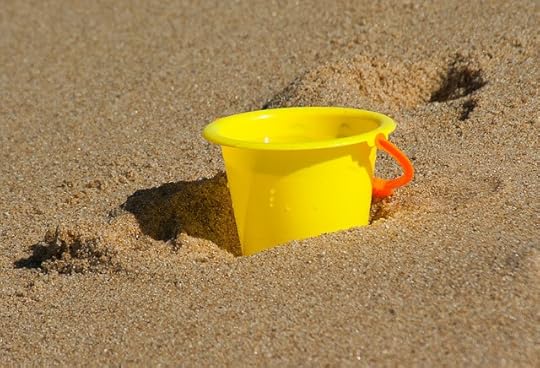Kris Spisak's Blog, page 14
February 14, 2019
Writing Tip 373: “To Riffle” or “To Rifle”?


If you want to get technical, you can “riffle” through the pages while you’re in the process of “rifling” through a collection of documents. Would a thief pause to appreciate the linguistic proximity? Probably not. But you can at least enjoy it.
This isn’t a gun debate. It’s a verb debate. And neither of them has anything to do with firearms.
There is a difference between “riffling” and “rifling” through the pages of your favorite writing reference book. Both are possible. But I’m guessing there’s only one that you mean.
And seriously, if you’re confused, please get those guns out of your head. That’s not where I’m going here.
“To rifle” is to do a rough, quick search of something—sometimes, it means to ransack, with an intention of theft. You can rifle through your junk drawer. You can rifle through your closet. Bad guys in books commonly “rifle” through the rooms that they are robbing to find the money or jewels or world-changing artifact that someone tucked away in a surprisingly obvious, not particularly secure place (be careful with this cliché, fiction writers).
“To riffle” is to manipulate something quickly. You can riffle the pages of a diary or a deck of cards. You can riffle through a notebook absentmindedly, listening to the sound of its shifting papers. You can riffle the pages of book to enjoy that lovely old-book smell. It helps to remember that “riffling” (with two “f”s) is a lot like “ruffling.”
Unsurprisingly, these two words share a common root.
To rifle came first, in roughly the fourteenth century, from the Anglo-French word rifler to plunder. “Riffle,” on the other hand, didn’t come to be until about the eighteenth century. Maybe it was an alliteration of “ruffle.” Maybe it was a blend of “ruffle” and “ripple.” Maybe someone thought there’s this word “rifle” out there so let’s make things a degree more confusing. (Okay, I might have made that last one up.)
You don’t want to ruffle (or riffle?) anyone’s feathers by getting this one wrong. The subtle difference is one worth knowing.
Now, where can you store this essential writing tip so that you won’t have to rifle around to find it next time you need it? I vote for bookmarking this blog, but if you feel so inclined, you can print it out with some of your other favorites so you can riffle through these communication reminders, absorbing their insights with your fingertips. That’s how learning works, right? Maybe not, but feel free to try.
Happy writing, folks.
Join 775+ subscribers and sign-up for my writing and editing email newsletter for more language tips and trivia like this.
The post Writing Tip 373: “To Riffle” or “To Rifle”? appeared first on Kris Spisak.
February 6, 2019
S2: E3 – “Butts” Where They Shouldn’t Be (i.e., Expressions you should really handle better)


It’s time to get a grip on your communications, isn’t it?
The English language can be difficult, I know. But there’s a certain pet peeve of mine we’re going to dive into today. It’s all about the word “butt.” And it’s not about starting a sentence with it. I’m talking about butts—B-U-T-T-S—that shouldn’t be there.
What are you walking into here? Keep listening to find out.
Season 2, Episode 3 – “Butts” Where They Shouldn’t Be (i.e., Expressions you should really handle better)
Approximate transcript:

Yes, the correct phrase is “nip it in the bud,” but don’t nip this one. It’s too lovely. Okay? Thanks.
Something we really need to nip in the bud is the typo “nip in the butt.” I promise you, that’s not the correct version of this idiom.
This expression goes back to gardening. If you’re trimming back something problematic, you nip it in the bud, removing the buds before they grew into something bigger, wilder, havoc-wreaking, and generally other than what you wanted.
Are your roses getting out of hand? Are your strawberries taking over the rest of the garden? Is that Virginia Creeper strangling the life out of everything?
You know what you need to do about that? Nip it in the bud.
The phrase “nip it in the bud” as we know it today, meaning to stop something before it grows into a bigger problem, has been used since at least the early 1600s. I don’t know when the confusion set in, but it certainly has. You’ll commonly find this phrase written as “nix it in the bud” and “nix it in the butt,” as well as the ever popular “nip it in the butt,” but none of these are the correct form.
We’re not talking anatomy. We’re talking flowers, folks. Let’s take the time to get this one right.

Some might call him majestic. I’m calling him a little bit annoyed about this typo.
I’m just saying, folks, there are a lot of butts where they shouldn’t be. And I’m not talking about politics or seating arrangements.
Just like “nip it in the bud,” the expression “buck naked” is often misspoken and mistyped with a reference to the buttocks that simply isn’t there.
But—with one “t”—to be completely clear, there should be no references to a tush, fanny, derriere, rump, backside, or badonkadonk in either of these phrases.
To be “buck naked” is to be completely naked. If you were only “butt naked,” maybe you’d just be without pants. I could take this way further, but I’m going to stop here. You’re welcome.
The popularity of “butt naked” seems to be growing, especially on the web, but just because you see it all over the place doesn’t mean that it’s the truth. Oops, I stumbled into politics again.
In conclusion, you know I have to note that this isn’t an expression that you should use in any formal correspondence, but whenever you do happen to use it, please take the time to get “buck naked” right.
Be honest. Have you ever gotten this wrong? It’s okay. I won’t tell. But now you can do better.
Join 775+ subscribers and sign-up for my writing and editing email newsletter for more tips like this
If you like what you’ve been hearing, don’t forget to subscribe to this podcast (via Apple Podcasts, Android, Google Podcasts, Stitcher, or RSS) so you’ll never miss out on another word you should know. Many thanks to those of you who have taken the time to rate my show on iTunes or wherever you listen.
Words. Language. Communications. You’ve got this.
The post S2: E3 – “Butts” Where They Shouldn’t Be (i.e., Expressions you should really handle better) appeared first on Kris Spisak.
January 31, 2019
Writing Tip 372: “Chomping at the Bit” or “Champing at the Bit”?


Some people have horseshoes for luck. Here’s one for luck with your spelling.
You can see it, can’t you? There’s the racehorse in the starting gate. He’s hoofing the ground. He’s whinnying. He’s chomping on his bit impatiently waiting for the starting gun to fire…
But the problem is, “chomping at the bit” isn’t the correct expression. The second problem is that “champing” and “chomping” are so incredibly close, this distinction is confusing in itself.
“Champing at the bit” means to chew anxiously at the bit, or the mouthpiece. The word “champing” has nothing to do with the fact that this may or may not be a champ (as in “champion”) racehorse. “Champing” is an old word that’s been around since the 14th century. The problem for this expression is that “champing” is pretty much non-existent in contemporary English—outside of this phrase, of course. Oh, and “champing” and “chomping” stem from the same Middle English word chammen, which became champen.
“Champing at the bit,” when used figuratively rather than literally—forget the actual horses—means to be eager to start or to be anxious to get moving.
“Chomping” also deals with biting down, but it usually has to do with eating. The horses aren’t stress-eating their bits. “Champing” at a bit is more akin to gnashing teeth.
This mistake is so common that some call it a normalized usage. You might be able to get away with “chomping” when you’re speaking or in casual use; however, if you’re going to be using this expression in your communications—whether in an email or a book manuscript—it’s always best to use the correct form to avoid looking ignorant.
Ignorance about the sport of kings never is a good thing.
Admittedly, the correct form of this expression might be one of the few details I know about horse-racing, but I’m calling it a win. Maybe not something for the winner’s circle, but a victory nonetheless.
Join 750+ subscribers and sign-up for my writing and editing email newsletter for more language tips and trivia like this.
The post Writing Tip 372: “Chomping at the Bit” or “Champing at the Bit”? appeared first on Kris Spisak.
January 23, 2019
S2: E2 – The plural form of “you” already exists (and all these other words you’ve always wanted)


This podcast is on one of my favorite explorations. It’s all about words you wish existed.
Sometimes the world seems annoyed that there just isn’t a word to express exactly what you want. There’s no English word for that intimate feeling of sitting around a fire in the winter with close friends (though it exists in Danish: hygge). There’s no word for the feeling of anticipation when you’re waiting for someone to show up at your house and you keep going outside to see if they’re there yet (though it exists in Inuit: iktsuarpok). Or what about the word for that panicky hesitation just before you have to introduce someone whose name you can’t quite remember? (The Scots call this tortle.)
What’s the word for the act of annoying older brothers (vybafnout)? Or the scratching of your head in order to help you remember something you’ve forgotten (pana po’o)? Or that old trick where you tap someone lightly on the opposite shoulder from behind to fool them (mencolek)? Just look at Czech, Hawaiian or Indonesian respectively, and they have your answers.
Of course, sometimes the word you need seems simple. How do you differentiate a singular versus plural “you”?
But here’s the secret. For this one, at least, the English language already has an answer.
Season 2, Episode 2 – The plural form of “you” already exists (and all these other words you’ve always wanted)
Approximate transcript:
Where I grew up, “y’all” is as everyday as the Appalachian Mountains that surround you like an embrace, but I now have family and friends who cringe a bit at that word. A few even occasionally use “yous,” and I try my best not to shudder, though I realize my own regionalisms probably have the same effect on their ears.
 Honestly, it all comes down to the same problem: When you’re talking to a group of people, what’s the best word to use to make it clear you’re talking to a whole bunch of people? You’re not just talking to Rebecca. You’re talking to her entire department or her entire family.
Honestly, it all comes down to the same problem: When you’re talking to a group of people, what’s the best word to use to make it clear you’re talking to a whole bunch of people? You’re not just talking to Rebecca. You’re talking to her entire department or her entire family.
Maybe you have the Goonies in the back of your head, with Sloth saying “Hey, you guys…” And, again, while it offers an answer, “you guys,” is still not quite right. While many utilize “guys” as a gender-neutral word, it still has a male connotation that doesn’t always sit well.
Slate recently published an article about this problem, arguing for the natural growth of “y’all.” I hear you, Slate. I absolutely do. Y’all have a great argument. In fact, I’m with you. I just don’t see it happening any more than someone living in the Blue Ridge Mountains of Virginia suddenly taking up “yous” in their everyday speech because it offers an answer to the linguistic problem at hand.
There are substitutes that come up, like “everyone,” “team,” and my old favorite “folks,” but I’d like to point out that the English language itself offers up an answer. It’s not one that’s especially modern, but it exists and should at least be a part of this conversation.
Let me remind you about “Ye/You” vs. “Thee/Thou”:
In the English of Shakespeare and the King James Bible, there were multiple versions of the word we now know simply as “you.” There were adjustments for singular or plural, sentence subjects versus sentence objects, and even for levels of respect.
“Thee” was the singular version of today’s word “you,” when it was used as a subject (e.g., “Thee sings so beautifully”; “get thee back to your studies”).
“Thou” was the singular version, when it was used as an object (e.g., I took thou to the castle; he called thou).
If we really want to dive deep here, we can even talk about “thy” and “thine,” which rhyme and function like second person singular versions of “my” and “mine”—or more simply said, they are the equivalent of “your” and “yours” for just one person.
Of course, “thee” and “thou” were also used as word choices of intimacy or as a sign of a lower station or rank. Close confidants would use “thee” and “thou,” as would adults speaking to children and the more powerful speaking to someone lower according to class hierarchies of the day.
“Ye,” could be compared to the French word vous. It is the subject pronoun to use when looking for that plural “you” of today—when you know “y’all” and “yous” aren’t the answer—or when speaking to someone, to whom you need to show respect.
Wow, even talking about respectful language is making me throw in a formal “to whom.” No ending with a preposition today, folks.
Of course, this version of “ye” is not to be confused with the other older version of “ye,” which was a substitute for “the” in the era where T + H was not yet the standard spelling of the “th” sound. (More on that here. You know you’re intrigued.)
“You,” of course, is the word we know and love—or at least that we know and use. Originally, it was designed only as a second person plural object form, but it’s shed its past limitations, hasn’t it?
If we’re going to make a push for more clarity with our plural “you,” I say, why not bring back the “thee/thou/thy/thine” forms to complement it, and let’s throw “ye” back into the conversation. A bit old-fashioned, sure, but there’s thoughtfulness and respect hiding in these old forms that might do good for our communications and society.
Let’s let “you” be “you.” It just needs some company to solve this contemporary problem.
Am I serious? Not completely. But if we’re going to talk about what to do about the plural “you,” let’s at least have the history of “you” as a part of the conversation.
Join 675+ subscribers and sign-up for my writing and editing email newsletter for more tips like this.
And don’t forget to subscribe to this podcast (via Apple Podcasts, Android, Google Podcasts, Stitcher, or RSS) so you’ll never miss out on another word you should know. Many thanks to those of you who have taken the time to rate my show on iTunes or wherever you listen.
Words. Language. Communications. You’ve got this.
The post S2: E2 – The plural form of “you” already exists (and all these other words you’ve always wanted) appeared first on Kris Spisak.
S2: E2 – The plural form of “you” already exists (an answer found in history)



This podcast is on one of my favorite explorations. It’s all about words you wish existed.
Sometimes the world seems annoyed that there just isn’t a word to express exactly what you want. There’s no English word for that intimate feeling of sitting around a fire in the winter with close friends (though it exists in Danish: hygge). There’s no word for the feeling of anticipation when you’re waiting for someone to show up at your house and you keep going outside to see if they’re there yet (though it exists in Inuit: iktsuarpok). Or what about the word for that panicky hesitation just before you have to introduce someone whose name you can’t quite remember? (The Scots call this tortle.)
What’s the word for the act of annoying older brothers (vybafnout)? Or the scratching of your head in order to help you remember something you’ve forgotten (pana po’o)? Or that old trick where you tap someone lightly on the opposite shoulder from behind to fool them (mencolek)? Just look at Czech, Hawaiian or Indonesian respectively, and they have your answers.
Of course, sometimes the word you need seems simple. How do you differentiate a singular versus plural “you”?
But here’s the secret. For this one, at least, the English language already has an answer.
Season 2, Episode 2 – The plural form of “you” already exists (an answer found in history)
Approximate transcript:
Where I grew up, “y’all” is as everyday as the Appalachian Mountains that surround you like an embrace, but I now have family and friends who cringe a bit at that word. A few even occasionally use “yous,” and I try my best not to shudder, though I realize my own regionalisms probably have the same effect on their ears.
 Honestly, it all comes down to the same problem: When you’re talking to a group of people, what’s the best word to use to make it clear you’re talking to a whole bunch of people? You’re not just talking to Rebecca. You’re talking to her entire department or her entire family.
Honestly, it all comes down to the same problem: When you’re talking to a group of people, what’s the best word to use to make it clear you’re talking to a whole bunch of people? You’re not just talking to Rebecca. You’re talking to her entire department or her entire family.
Maybe you have the Goonies in the back of your head, with Sloth saying “Hey, you guys…” And, again, while it offers an answer, “you guys,” is still not quite right. While many utilize “guys” as a gender-neutral word, it still has a male connotation that doesn’t always sit well.
Slate recently published an article about this problem, arguing for the natural growth of “y’all.” I hear you, Slate. I absolutely do. Y’all have a great argument. In fact, I’m with you. I just don’t see it happening any more than someone living in the Blue Ridge Mountains of Virginia suddenly taking up “yous” in their everyday speech because it offers an answer to the linguistic problem at hand.
There are substitutes that come up, like “everyone,” “team,” and my old favorite “folks,” but I’d like to point out that the English language itself offers up an answer. It’s not one that’s especially modern, but it exists and should at least be a part of this conversation.
Let me remind you about “Ye/You” vs. “Thee/Thou”:
In the English of Shakespeare and the King James Bible, there were multiple versions of the word we now know simply as “you.” There were adjustments for singular or plural, sentence subjects versus sentence objects, and even for levels of respect.
“Thee” was the singular version of today’s word “you,” when it was used as a subject (e.g., “Thee sings so beautifully”; “get thee back to your studies”).
“Thou” was the singular version, when it was used as an object (e.g., I took thou to the castle; he called thou).
If we really want to dive deep here, we can even talk about “thy” and “thine,” which rhyme and function like second person singular versions of “my” and “mine”—or more simply said, they are the equivalent of “your” and “yours” for just one person.
Of course, “thee” and “thou” were also used as word choices of intimacy or as a sign of a lower station or rank. Close confidants would use “thee” and “thou,” as would adults speaking to children and the more powerful speaking to someone lower according to class hierarchies of the day.
“Ye,” could be compared to the French word vous. It is the subject pronoun to use when looking for that plural “you” of today—when you know “y’all” and “yous” aren’t the answer—or when speaking to someone, to whom you need to show respect.
Wow, even talking about respectful language is making me throw in a formal “to whom.” No ending with a preposition today, folks.
Of course, this version of “ye” is not to be confused with the other older version of “ye,” which was a substitute for “the” in the era where T + H was not yet the standard spelling of the “th” sound. (More on that here. You know you’re intrigued.)
“You,” of course, is the word we know and love—or at least that we know and use. Originally, it was designed only as a second person plural object form, but it’s shed its past limitations, hasn’t it?
If we’re going to make a push for more clarity with our plural “you,” I say, why not bring back the “thee/thou/thy/thine” forms to complement it, and let’s throw “ye” back into the conversation. A bit old-fashioned, sure, but there’s thoughtfulness and respect hiding in these old forms that might do good for our communications and society.
Let’s let “you” be “you.” It just needs some company to solve this contemporary problem.
Am I serious? Not completely. But if we’re going to talk about what to do about the plural “you,” let’s at least have the history of “you” as a part of the conversation.
Join 675+ subscribers and sign-up for my writing and editing email newsletter for more tips like this.
And don’t forget to subscribe to this podcast (via Apple Podcasts, Android, Google Podcasts, Stitcher, or RSS) so you’ll never miss out on another word you should know. Many thanks to those of you who have taken the time to rate my show on iTunes or wherever you listen.
Words. Language. Communications. You’ve got this.
The post S2: E2 – The plural form of “you” already exists (an answer found in history) appeared first on Kris Spisak.
January 16, 2019
Writing Tip 371: To “Wet” or “Whet” Your Appetite?


Drool-worthy, right? But what does that mean for your appetite?
When people talk about enticing you, they aren’t talking about making you drool. The question about how do you spell “whetting” your appetite comes up often, and I think it often comes back to confusion about that saliva.
You see something delicious and you salivate. Sure, I get it, but that has nothing to do with this expression.
To “whet”—as in “to whet your appetite,” the correct spelling of the phrase—is an old word that doesn’t pop up frequently in day-to-day conversation unless you’re talking about this one expression. The Old English form of this word was related to literal sharpening. Think of medieval instruments and weapons. Those could be whetted. (Yikes.) Its metaphorical sense, as in whetting one’s desire, didn’t come to be until roughly the 15th century.
To “wet” means to dampen or maybe even soak. Or, something can be wet, meaning to be damp, moist, drenched, dripping, soaked, water-logged—you get the idea.
If you think about something mouth-watering, food-related or not, we’re talking about something whetting your appetite. Don’t let any drool involved confuse you.
Writing Tip 371.2 – To “wet your whistle” is worth a note, because it’s actually the opposite of “whetting your appetite.” A whet appetite is stimulated. To wet one’s whistle, on the other hand, is to have a thirst fully quenched.
This expression comes from the idea of your whistle, or more specifically your mouth or lips that allow you to whistle, being wet by a drink. Usually, the drink is alcoholic. There is nothing about whetting (i.e., sharpening) involved. Or at least I hope not.
I’m glad we have that settled, folks.
Join 750+ subscribers and sign-up for my writing and editing email newsletter for more language tips and trivia like this.
The post Writing Tip 371: To “Wet” or “Whet” Your Appetite? appeared first on Kris Spisak.
January 9, 2019
S2: E1- When Grammar Goes Big: Beyoncé, Gwen Stefani & Broadway (Bringing in the New Year by Ringing in the New Year)


This is the start of season 2. How to start with that bang? Let’s talk Beyoncé, Gwen Stefani, and a classic Broadway show—and, of course, the words they use. You might not have known it, but they have a major disagreement on the usage of a phrase. Specifically, should it be “if I were” or “if I was”?
Today, we’re going to get down to the root of it, plus answer another big one that I know has been bothering you: Is it “ring in the new year” or “bring in the new year”?
It’s time to dive in.
Season 2, Episode 1 – When Grammar Goes Big: Beyoncé, Gwen Stefani & Broadway (Bringing in the New Year by Ringing in the New Year)
Approximate transcript:

Make a wish. Imagine the impossible. Just make sure you get your verbs straight.
If I were a rich man… If I were a boy… Whether you want to start this “if I was” vs. “if I were” conversation with Fiddler on the Roof or Beyoncé, it’s a conversation we need to have.
Let’s talk unreal conditionals and the subjunctive mood. Actually, no, let’s not. That doesn’t sound very exciting.
Let’s talk music and musicians who get grammar. More exciting? Almost. But bear with me.
You know that if you went to see your favorite band yesterday, you’d use verbs like this: “I was there”; “it rocked”; “he was bummed to miss that solo”; “you were amazing on the drums.”
But if it wasn’t a real show—a pretend show, a show you’re dreaming about existing but that doesn’t, a hypothetical or unlikely show—you’d swap up your word choice like this: “If I were there”; “if he were there”; “if they were there.”
I were… are you cringing? Deep breath. It’s what you need here, whether you like it or not.
In unreal conditionals (darn it, I didn’t mean to let that slip in again!), you’ll often see words like “would” or “ought to.“ For example, “If asked, I would step up to the stage” or “If given the opportunity, she would have blown them all away.” But when you need the verb “to be” following that “if” in these unreal situations, it always remains “were,” even when you’re working with subjects like “I” or “he,” which typically pair with a “was.” This leads to phrases like “if I were lead singer” and “if it were my birthday.”
If I were a carpenter… If I were your woman… Personally, I’m impressed that so many artists get it right. Then there’s Gwen Stefani, who went rogue in If I Was a Rich Girl, a remix of the Fiddler on the Roof classic. The gender swap, I get, but the verb swap…? Why, Gwen, why? You just confused a generation.
Is it because the “if I was a rich girl” isn’t a hypothetical in her situation? She is indeed rich, so it’s not an unreal conditional? It’s real? Honestly, I think it’s a mistake, but we can pretend she’s just going to grammar levels over all of our heads.
As for the rest of us, know your “if I was” vs. “if I were” and own it. Whether you’re on stage, in the recording studio, or maybe just belting out your favorite jam in the shower.
And since dreams and perhaps even goals might be on your mind right now, let’s shift to a different question.
 There’s a debate that arises every year—often intensified by champagne or eggnog. Is it “ring in the new year” or “bring in the new year”? Can you once and for all have a definitive answer to give that nut still wearing a Rudolph sweater? Perhaps, he’s thinking the same thing about you, the crazy lady in a little black dress who debates locution at holiday parties. (Or is that just me?)
There’s a debate that arises every year—often intensified by champagne or eggnog. Is it “ring in the new year” or “bring in the new year”? Can you once and for all have a definitive answer to give that nut still wearing a Rudolph sweater? Perhaps, he’s thinking the same thing about you, the crazy lady in a little black dress who debates locution at holiday parties. (Or is that just me?)
Well, I hate to say it, but you’re both right. Though only different by a single letter, both expressions are recognized as standard. “Ringing in the new year” refers to the old tradition of celebrating beginnings and endings with bells—à la Alfred Lord Tennyson’s 1850 poem “Ring Out, Wild Bells.” On the other side of things, “bringing in the new year” references ushering in the new beginning. Thus, you can bring in the new year by ringing in the new year. How’s that for a fun answer to the debate?
Interesting side note: did you know New Year resolutions date back to ancient Babylon when people made good behavior promises to the gods? Any big promises you’re making this year?
Happy New Year, folks, and happy writing!
Join 750+ subscribers and sign-up for my writing and editing email newsletter for more tips like this. Or, of course, there’s always the book, Get a Grip on Your Grammar: 250 Writing and Editing Reminders for the Curious or Confused.
More details on my new book coming soon.
And don’t forget to subscribe to this podcast (via Apple Podcasts, Android, Google Podcasts, Stitcher, or RSS) so you’ll never miss out on another word you should know. Many thanks to those of you who have taken the time to rate my show on iTunes or wherever you listen.
Words. Language. Communications. You’ve got this.
The post S2: E1- When Grammar Goes Big: Beyoncé, Gwen Stefani & Broadway (Bringing in the New Year by Ringing in the New Year) appeared first on Kris Spisak.
January 3, 2019
Writing Tip 370: “Beyond the Pale” vs. “Beyond the Pail”

 If we’re mixing idioms, there might be something about kicking a bucket then going beyond the pail, but whatever the origin story your mind is making up for that one, don’t give it a second more of contemplation.
If we’re mixing idioms, there might be something about kicking a bucket then going beyond the pail, but whatever the origin story your mind is making up for that one, don’t give it a second more of contemplation.
“Beyond the Pail” isn’t an expression. It could be where you walk past if you’re retrieving water from your spigot, but there are no pails or buckets involved in this old phrase.
“Beyond the pale” is the correct idiom, meaning something that is out of bounds or beyond what is acceptable. It speaks sometimes to the bizarre and sometimes to a lack of propriety or even the offensive.
The origin of “beyond the pale” seems to harken back to a definition of “pale” that you might not have heard of. We’re not talking about the skin of someone who has seen a ghost or who stays clear of the sun. We’re talking about a definition that comes from the Old English word pāl, and as a hint, the word “pole” derives from this same word.
Historically, a “pale” is a pointed wooden stake that creates a barrier or marks off an enclosure. It can sometimes reference the enclosed area or jurisdiction itself, such as an Irish Pale or the Pale of Calais on France (note the capitalization), which were both historical districts.
If you’re going to the beach, don’t stress about going beyond the pail. If you spend some time soaking up the sun, you might go beyond the paleness of your winter-weary skin, but be sure not to act beyond the pale or the lifeguard might ask you to leave.
Kicking buckets—both literal and metaphorical—is probably best to be avoided. As for pails and pales, it’s good to know the difference and, when necessary, to act (and spell) accordingly.
Join 750+ subscribers and sign-up for my writing and editing email newsletter for more language tips and trivia like this.
The post Writing Tip 370: “Beyond the Pale” vs. “Beyond the Pail” appeared first on Kris Spisak.
December 12, 2018
Writing Tip 369: God Rest Ye Merry, Gentlemen (yes, the comma goes there)

We’re not talking about any “merry gentlemen” here, folks. Did you ever notice the correct comma placement within this opening line of the classic Christmas carol?
From Rudolph to the Grinch to Deck the Halls, yes, my holiday song breakdown continues…
Plus, you now have some nostalgic new slang to drop with your friends. What’s not to love?
Rest ye merry, everybody!
Join 750+ subscribers and sign-up for my writing and editing email newsletter for more language tips and trivia like this.
The post Writing Tip 369: God Rest Ye Merry, Gentlemen (yes, the comma goes there) appeared first on Kris Spisak.
Writing Tip 368: God Rest Ye Merry, Gentlemen (yes, the comma goes there)

We’re not talking about any “merry gentlemen” here, folks. Did you ever notice the correct comma placement within this opening line of the classic Christmas carol?
From Rudolph to the Grinch to Deck the Halls, yes, my holiday song breakdown continues…
Plus, you now have some nostalgic new slang to drop with your friends. What’s not to love?
Rest ye merry, everybody!
Join 750+ subscribers and sign-up for my writing and editing email newsletter for more language tips and trivia like this.
The post Writing Tip 368: God Rest Ye Merry, Gentlemen (yes, the comma goes there) appeared first on Kris Spisak.



